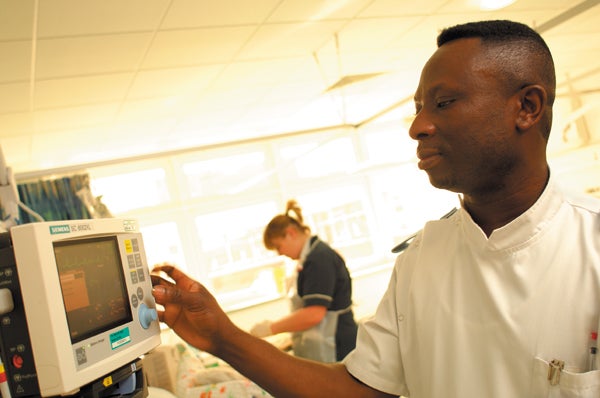The future of nursing

Britain’s changing demographics mean we need more nurses than ever says the chief executive and general secretary of the Royal College of Nursing.
On a typical day 835,000people will visit their GP, 94,000 will be admitted to hospital in an emergency, 36,000 people will attend hospital for planned treatment, 28,000 sight tests will be carried out and 18,000 calls will be made to NHS Direct, the health service’s 24 hour information line. Nurses are part of, and often lead, the thousands of healthcare teams who deliver this care, up and down the country, every day of the year. They are the rock upon which Clement Attlee built the Health Service in 1948 and the glue that holds it together today, delivering over 340 million treatments per year.
Looking ahead to the NHS of the 21st century, the Government wants to move towards a more responsive, personalised health service that provides a greater number of services in more convenient ways. In his first major speech on the issue, the Prime Minister outlined his vision for an NHS with a greater emphasis on preventing illness and curing unhealthy lifestyles, instead of a service which primarily focuses on curing illness. But with an ageing nursing workforce and general population, tougher immigration laws and an increase in life expectancy across the country, healthcare in the UK needs more people to enter the nursing profession than ever before. In the early Nineties, a decision was taken to reduce the number of training places for nurses. The knock-on effect of this move can be seen in the average age of a UK nurse; now 42 years old. While our healthcare system won’t immediately feel the impact of this, the most recent RCN Labour Market Review shows that roughly 180,000 UK nurses are due to retire in the next 10 years. When you consider that there are over half a million nurses in the UK, the fact that nearly a third could retire inside a decade emphasises the urgent need for more people to join the profession.
For a number of years, the NHS has recruited nurses from abroad to fill workforce gaps but tighter immigration laws will make this less of an option and has already contributed to a reduction in the number of nurses recruited internationally. Even if this trend is reversed by the Government, it would barely make a dent in the anticipated labour shortfall. At the same time, the number of UK nurses leaving the health service to work in other countries is rising fast. NHS UK’s prime competitors for UK nurses are the US and Australia, the latter of which recruited almost 5,000 UK nurses last year. Add to that the challenge of an ageing workforce and the numerous challenges of an ageing UK population, and the need for more new recruits becomes increasingly apparent.
It’s a well-known fact that the UK population is growing and ageing rapidly. According to National Statistics, the population increased by just under six million between 1971 and 2006; a rise that occurred disproportionately among the older age groups. In the next 30 years, the population is expected to increase by about seven million, creating an inevitable increase in the demand for healthcare. The most relevant demographic change, however, is among those who are most likely to require regular healthcare – the over 65s. In 2004, 16 per cent of the population made up this age group, but the Office for National Statistics suggests that the percentage will rise to 23 per cent by 2031 or one in five people in the UK. This, combined with advances in healthcare over time and the resulting increase in life expectancy, will create new workforce challenges for the NHS to meet. Most importantly, the Government needs to ensure that the NHS has the capacity to deal with the substantial increase in the number of people with chronic conditions, who require long-term care.
A key plank of the Government’s NHS reform agenda is the move from acute to community care. In other words, more and more traditionally hospital-based services are going to be provided in the community and therefore closer to home. Naturally, the NHS will need more nurses trained in community care and it’s in this area that there’s already a shortage. All of this means two things. Firstly, new nursing recruits are needed now more than ever. Secondly, the role of nurses in leading and delivering healthcare is expanding and becoming more and more significant.
The shift in care closer to home, the increased number of people requiring care for longterm conditions due to increased life expectancy, and the new emphasis on illness prevention will almost certainly be more dependent on the nursing profession than any other group of healthcare professionals. With this increased reliance on the profession to deliver a 21stcentury National Health Service, it’s never been a more exciting time to join the nursing profession.
Subscribe to Independent Premium to bookmark this article
Want to bookmark your favourite articles and stories to read or reference later? Start your Independent Premium subscription today.

Join our commenting forum
Join thought-provoking conversations, follow other Independent readers and see their replies